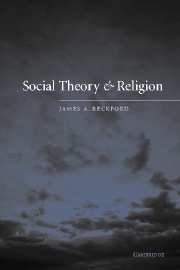3 - The vagaries of religious pluralism
Published online by Cambridge University Press: 18 December 2009
Summary
Since the 1960s it has been almost an article of faith for sociologists of religion to describe advanced industrial and late-modern societies as ‘pluralist’. As we saw in the previous chapter, the notion of pluralism is inseparable from some influential versions of secularisation theory. In addition, it is intimately associated with ideas about the subjectivisation and the privatisation of religion. Pluralism is therefore one of the theoretical ideas that have helped to shape the sociology of religion; but criticisms have also been voiced (Flanagan 1990; Riis 1999; Champion 1999).
My intention is not to dismiss the idea that today's advanced industrial or late-modern societies are pluralist. Instead, I want to argue that the concept of pluralism is much more complicated and problematic than the term seems to imply. I also want to show that a more nuanced approach to pluralism can help to make sociological sense of many aspects of religious change today.
In order to enhance the importance of the topic of ‘pluralism’ in the sociological analysis of religious change I will need to do three things. The first is to explicate the term's current meanings. The second is, having exposed some problems with the most influential uses to which sociologists of religion have put the term ‘pluralism’, to propose a new term for some of the ideas that presently come ‘bundled with’ pluralism. And the third is to outline what seems to me to be a productive way of exploring pluralism today.
- Type
- Chapter
- Information
- Social Theory and Religion , pp. 73 - 102Publisher: Cambridge University PressPrint publication year: 2003
- 5
- Cited by

